Internet of Things (IoT) is revolutionizing the Transportation and Logistics industry by providing highly integrated and streamlined transportation and logistics management solutions.
Previously logistics companies mainly focused on moving a product from one location to another location. Now because of high competition and multiple challenges the companies started focusing on customer needs and expectations. So now they aim to ensure quick and on-time delivery, smart fleet management, supply chain monitoring, inventory management, safe transportation, and warehouse management.
IoT- Internet of things
IoT in the logistics and transportation sectors is providing highly advanced solutions by connecting in-vehicle sensors and other interconnected digital devices over the network. The sensors that are installed in transport vehicles, containers will continuously capture and process data that can be acted upon in real-time.
Over the next decade, the IoT in transportation and logistics is expected to generate $1.9 trillion in value, part of an overall $8 trillion in IoT value generated globally, according to the DHL and Cisco Internet of Things Trend Report.
Advantages of integrating IoT in Transportation and Logistics
As IoT is transforming the Transportation and Logistics Industry, Logistics companies aim to move from a traditional approach of managing orders to highly advanced technology. Below given are the main advantages of integrating IoT in the transportation and logistics industry.
Smart fleet management
Fleet management plays a crucial role in managing different tasks like maintaining schedules, regular vehicle usage, and service routes. It is essential to reduce the fleet downtime to gain profits in the business. By using IoT-based scanners, computers, and other mobile devices, companies can gain visibility of the product and can streamline the operations in a better way.
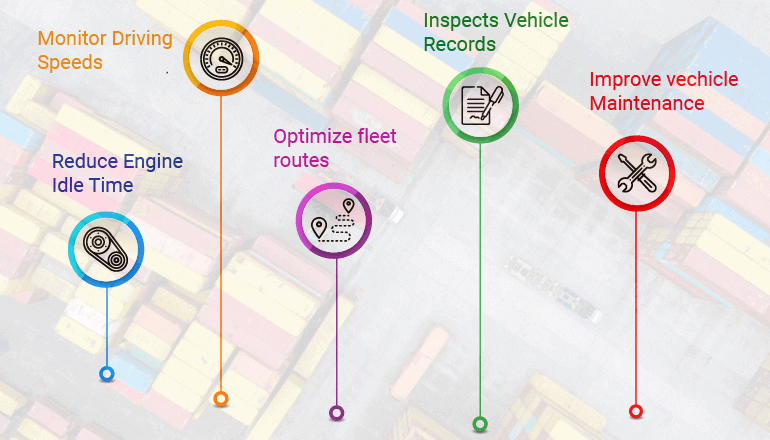
Apart from this, the real-time infrastructure monitoring through connected IoT devices guide the field-force technicians to take precautionary measures successfully avoiding future risks. This provides the organization with remote intelligence facilitating it in managing the fleet and reduce any unnecessary responses. Smart fleet management helps organizations to formalize their operations improving the overall performance of the business.
Fleet management saves time and helps in maintaining data accurately replacing all the manual work being done previously. Also, IoT connectivity facilitates an organization to communicate with its agents regarding the repairs, maintenance, and other issues. Regular updates can also be given on certain conditions regarding weather or traffic through this connectivity. This helps in managing the fleet efficiently by increasing their safety, reducing damaged inventory, allows on-time responding to customer inquiries and decreasing insurance-related costs which are critical to a company’s revenue.
Supply chain visibility
Supply chain management involves the streamlining of business activities to maximize customer value and gain a competitive advantage. The supply chain is comprised of all the businesses and individuals associated with creating a product, from raw materials to finished merchandise. This includes farming and refining, design, manufacturing, packaging, and transportation. Supply chain management carries various challenges about the product condition. So both companies and their customers prefer to trace the product lifecycle from the origin of products to their transportation to the customer’s hands.
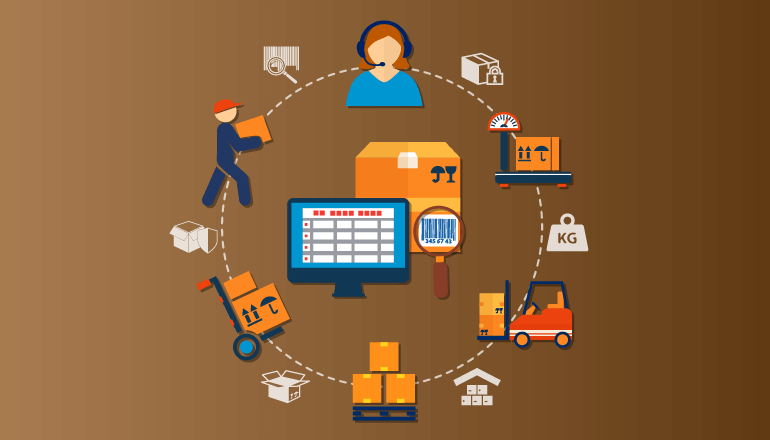
IoT can provide an efficient supply chain platform for the logistics and transportation industry. The complete visibility and faster detection of issues can be done by using IoT in logistics and transportation. Supply chain visibility is very important to track the products, preventing order errors, and to improve the supply chain by making data readily available to all stakeholders, including the customer. The enhanced supply chain visibility leads to long-term profits. It also allows the exchange of real-time information with the stakeholders and reduces disruption.
IoT helps in combining an organization’s online presence with the physical stores which enable it to collect and make data at key points in the supply chain. This successfully optimizes supply chain responsiveness. Apart from this, automated data capture helps in avoiding human errors. The sensor-enabled IoT solutions can monitor the location and speed of vehicles allowing the maintenance operations. IoT-based sensing technology allows to maintain temperature stability and minimize the wastage of perishable goods. By efficiently running the supply chains, any organization can quickly deliver the products to the end-user for a low cost.
Warehouse management
Warehousing is amongst the crucial parts of a transportation and logistics business organizations. Effective management of the warehouse helps an organization to complete the operations more efficiently. IoT-enabled mobile devices help in Tracking vehicles, equipment, and inventory data which helps the small-scale as well as large-scale organizations to withstand the market standards.
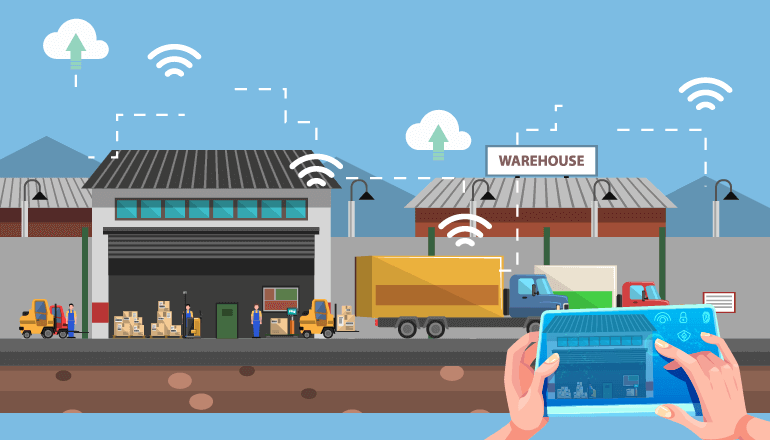
The storehouses in the transportation and logistics industry can share all the critical data in the centralized cloud by collecting real-time data through physical devices. Thus, IoT-based mobile devices at a storehouse will increase the productivity of an organization by analyzing the available historical data and delivering the product on time.
The IoT-based mobile devices will decrease the risks of manually conducted routine operations by the in-house personnel. It will also reduce numerous visibility related damages including indistinct trailer moves, goods shrinkage, consumed fuel and wasted time, etc. This helps in tracking the product and location much faster.
Inventory tracking and management
Inventory tracking and management play a key role in the logistics industry. Every company needs to manage the inventory so that the excess amount of goods is not stored at the company and at the same time the demand for customers is met. IoT can be used for inventory and equipment monitoring. By placing small inexpensive sensors, companies can easily track inventory items, monitor their status and create a smart warehouse system.
![]()
IoT technology helps employees to successfully prevent any losses, ensure safe storage of goods, as well as efficiently locating a product when needed. Today, almost all logistics companies have adopted IoT solutions in their business. The minimization of human errors becomes possible by using IoT technology.
Predictive analytics
Predictive analytics helps companies and major firms in creating effective business development strategies, improve the decision-making process, make smart business insights, and manage risks. IoT provides predictive maintenance information, alerting the engineers for the potential breakdowns.
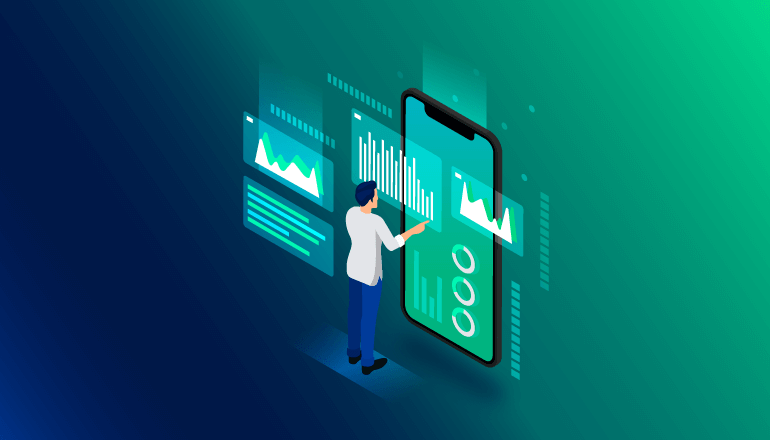
Internet-enabled devices will collect large amounts of data and transmit them to the central system for further analysis. IoT and predictive analytics solutions can be utilized for route and delivery planning and also for the identification of various defects before any damage occurs. The outputs are a timely replacement of machinery parts, prevention of any damages or crashes and efficient maintenance of the equipment.
Use cases of IoT in the logistics industry
There are many creative use cases of IoT where the company trusts the use of initiatives like sensors, RFID chips for transmitting information and storing it to cloud for further usage. Below given are the few use cases of IoT in the logistics industry.
IoT based drone
A drone is a small aircraft also known as Unmanned Aerial Vehicles (UAN) which can be controlled by remote control by a pilot on the ground. They can also collect small objects like cameras for visual information. Drones are mainly used in retail, logistics, agriculture, and e-commerce industries. Drones can add speed and efficiency to the work environment.
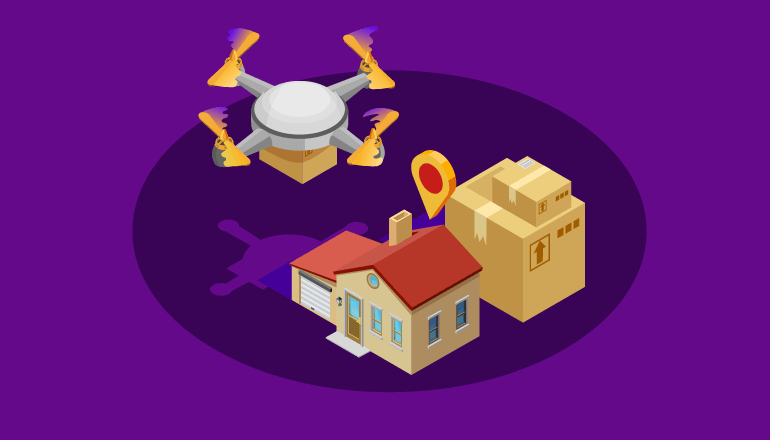
In the transportation and logistics industry, drones can ensure business process automation by providing inventory tracking, easy and fast transportation of goods, and instant in-store delivery. Therefore, they enable us to solve last-mile delivery problems.
Self-driving vehicles
Soon, we will witness the wide usage and adoption of self-driving vehicles, being tested at the moment. Logistics companies will be the first to take advantage of their integration into the business.
IoT devices are responsible for collecting large amounts of data, the analytics system turns them into smart driving routes and directions. This helps the businesses to minimize car accidents, reduce operating costs and optimize road traffic.
Read more: How fleet management process is running smoothly via mobile app Technology
Transportation and logistics companies use IoT technology not only to increase efficiency and productivity of operations but also to strengthen the way operations take place. Nextbrain Technologies is a renowned mobile app development company providing IoT application development services to the clients rolling out their product ideas.
Recent Insights
- Why choose React Native for mobile app development
- Innovative mobile app ideas & latest trends for the sports industry
- The future of web development with AI
- Video analytics: Delving deep to its applications and opportunities
- A complete guide to AI object tracking with DeepSORT
- Nextbrain giving platinum sponsorship for golden tree awards, dubai



Saran
Author
Views : 3906 | Posted on September 15, 2020